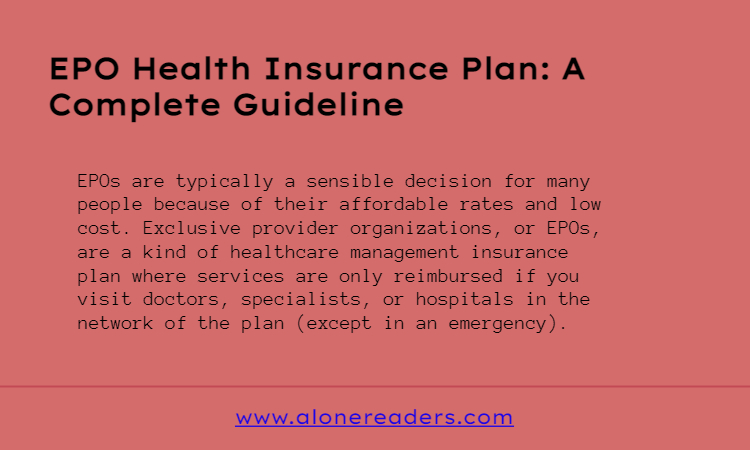
You could be wondering if an EPO health insurance plan is the best option for you when searching for a new health insurance coverage. EPOs are typically a sensible decision for many people because of their affordable rates and low cost.
Exclusive provider organizations, or EPOs, are a kind of healthcare management insurance plan where services are only reimbursed if you visit doctors, specialists, or hospitals in the network of the plan (except in an emergency).
Because the EPO will only pay for medical expenses if they are paid for by healthcare organizations with which the EPO has a contract, this classification is given to EPO health insurance. Similar to other health insurance plans that have a monthly payment, EPOs will cover out-of-area care in an emergency to keep you inside their managed care organizations.
Similar to their relatives, the PPOs & HMOs, EPO health plans have cost-containment requirements for how you must receive your medical care.
In an EPO health insurance plan, you are only covered for the medical care you receive from local providers, with the exception of emergencies or times when you have prior authorization from your insurance provider. Below, find the health insurance terms you'll need to understand the fundamentals of EPO health insurance:
An EPO health insurance plan might be a good option if you don't want to deal with getting referrals and would rather manage your own care without a primary care physician's help.
Making this choice is also wise if you want a plan with some flexibility but don't want to pay the highest PPO premium.
Don't forget that an EPO plan does not cover services obtained outside of the network.
If you prefer to choose any doctor or facility you choose or if you already deal with providers who aren't in the EPO's provider pool, an EPO plan might not be able to provide your family with the healthcare coverage they need.
EPO health insurance is different from other managed care plans in terms of provider options, cost, and flexibility. Their major differences are as follows:
Similar to HMO plans, EPOs require the use of network providers for regular care. The primary distinction is that an HMO requires you to select a PCP who will oversee your medical treatment and make referrals for specialist visits. You can visit specialists without a referral if you have an EPO. But you should first confirm that the supplier is a part of your EPO network and see if your plan calls for prior authorization.
EPO vs PPO insurance
An EPO doesn't need specialty referrals, much like a PPO. Yet unlike an EPO, which only covers in-network treatment unless there is an emergency, a PPO typically offers some coverage for out-of-network services. Both EPOs and PPOs typically have a deductible, which is the sum you are responsible for paying out of pocket before coverage starts in.
EPO vs POS insurance
POS health plans permit both in-network and out-of-network care, albeit out-of-network services will cost more. To oversee their care and make expert referrals, POS members must select a PCP. With an EPO, you are limited to in-network care but are not required to choose a PCP or get recommendations. A deductible is often not required for POS policies.
Depending on where you reside and the particular plan you select, you may have to pay different amounts for your EPO health insurance premiums and copays. You will often be paying for copays, deductibles, and coinsurance.
If you need help paying your monthly premiums, a health insurance subsidy is an option.
An EPO health insurance plan costs an average of $436 a month for a 30-year-old.
Benefits
Drawbacks
Only if your employer offers it or if you have group health insurance through your job are you eligible to choose an EPO Medicaid plan.
If your employer doesn't offer coverage, you can acquire an EPO through the ACA's new insurance marketplace.
You can only select a new plan during Open Enrollment, which takes place from November through December and lets anyone buy an insurance policy.
If you change jobs or have a major life change, such as the birth of a child, you can qualify for Special Enrollment, which enables you to enroll in a new plan outside of the Open Enrollment period.
If you want to manage your own care without the help of a primary care provider and don't want the trouble of receiving referrals, an EPO health insurance plan may be a smart choice. It's also a smart decision if you want a plan with some flexibility but don't want to pay the highest PPO cost.